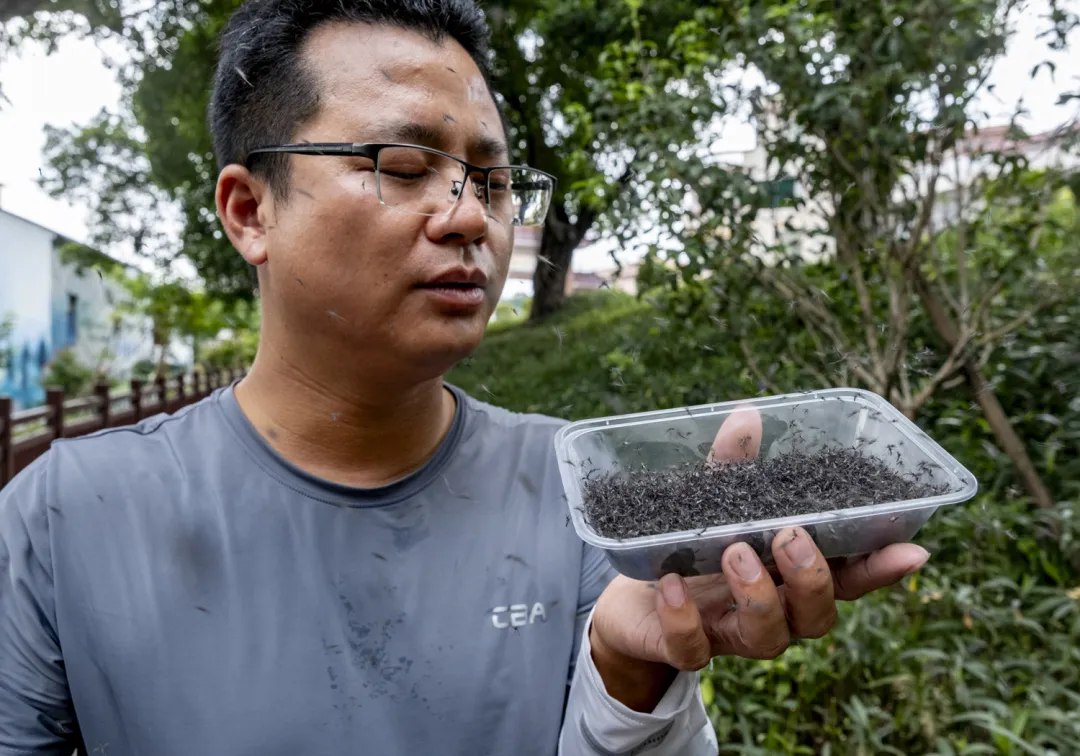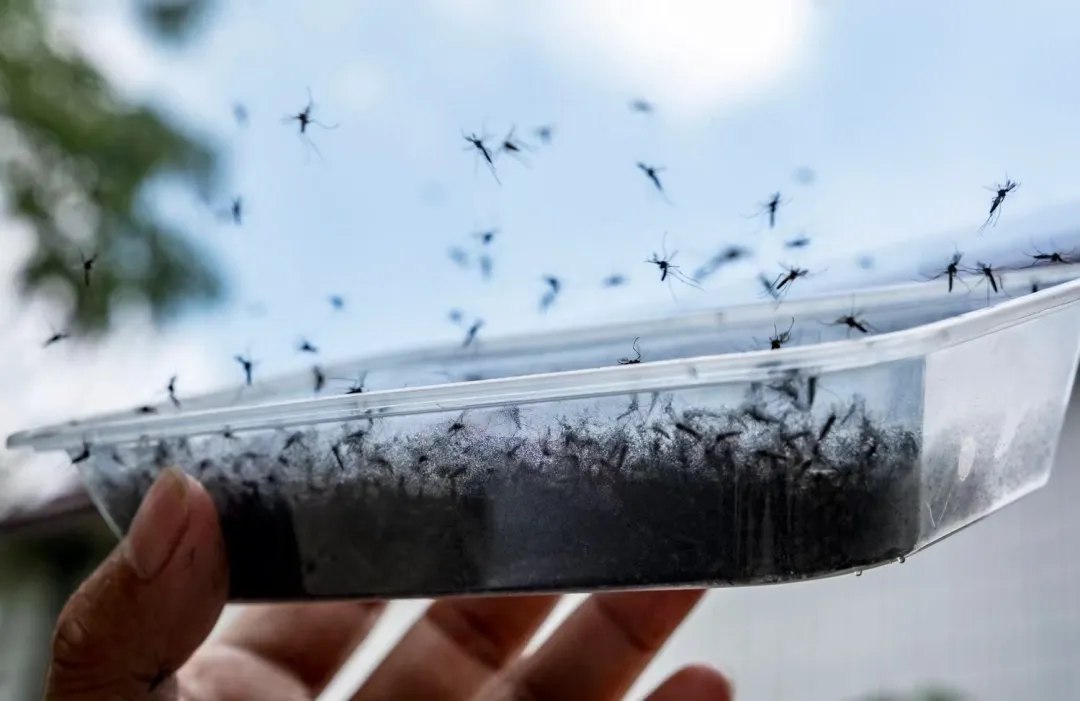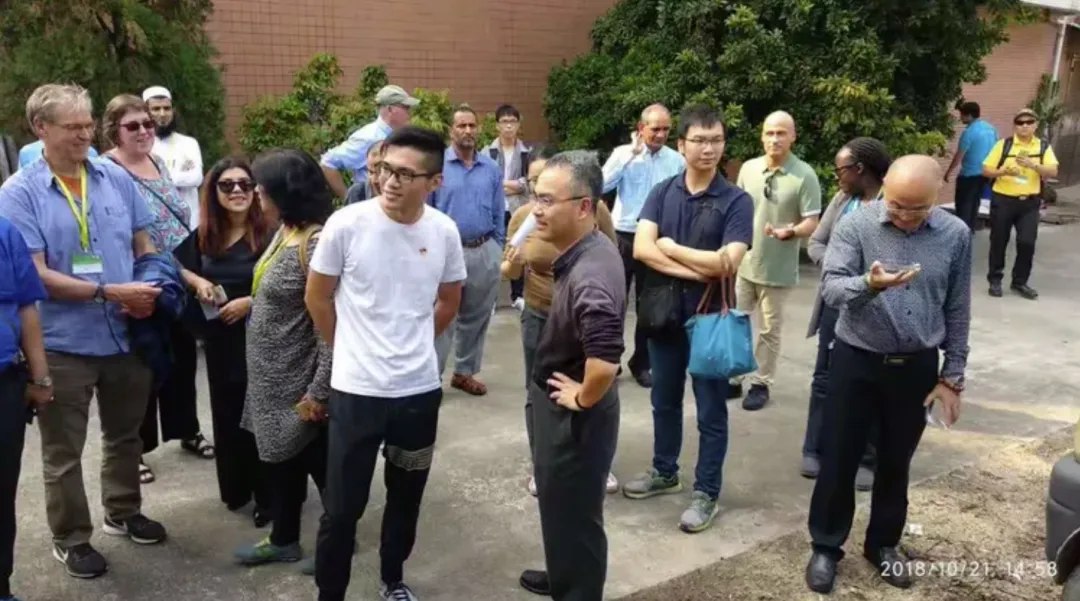




- BRNN
- BRI News
- BRNN News
- Database
Official Documents Polices and Regulations
Inter-government Documents International Cooperation BRI Countries
Business Guide Economic Data BRI Data
Trade
Investment Projects Latest projects
Cases - Content Pool
In Xiashi village, Jianggao township, Baiyun district, Guangzhou, capital of south China's Guangdong Province, a group of "professional mosquito releasers" have been releasing mosquitoes for seven consecutive years.
Their goal is to prevent dengue fever, which is mainly spread through the bites of Aedes mosquitoes.

Gan Renxian, a researcher from a research team that developed the biological mosquito control technology of "using mosquitoes to control mosquitoes", releases male Aedes albopictus mosquitoes infected with Wolbachia bacteria at Xiashi village, Jianggao township, Baiyun district, Guangzhou, capital of south China's Guangdong Province. (Photo/Guangzhou Daily)
Preventing mosquito bites is considered crucial in the effort to prevent dengue fever. Common methods for controlling the spread of the disease include eliminating mosquito breeding grounds and using insecticides.
However, in Xiashi village, a professional team has been using a biological control technology of releasing 300,000 to 500,000 mosquitoes every week to prevent the spread of dengue fever.
Unlike common mosquitoes, the mosquitoes released in Xiashi village are male Aedes albopictus mosquitoes carrying Wolbachia bacteria, referred to as "beneficial mosquitoes" or "sterile male mosquitoes," according to Gan Renxian, a researcher from the research team that developed the biological mosquito control technology of "using mosquitoes to control mosquitoes".
"The mosquitoes that bite people in the village include Aedes albopictus, Culex quinquefasciatus, and Armigeres subalbatus. Aedes albopictus, commonly known as the Asian tiger mosquito, is the culprit in spreading dengue fever and Zika virus," Gan said.
"The strategy of 'using mosquitoes to control mosquitoes' is mainly to reduce the number of Aedes albopictus mosquitoes," he noted.
"We have a mosquito factory for large-scale production, where we use insect embryo microinjection technology to successfully create a strain of Aedes albopictus mosquitoes carrying a new type of Wolbachia bacteria," Gan said.

Male Aedes albopictus mosquitoes carrying Wolbachia bacteria are released in Xiashi village, Jianggao township, Baiyun district, Guangzhou, capital of south China's Guangdong Province, to prevent dengue fever. (Photo/Guangzhou Daily)
"Through a meticulous process of separating males and females, we select male mosquitoes for release. When these male mosquitoes mate with wild female Aedes albopictus mosquitoes in the field, the eggs laid by the females will not successfully hatch, preventing them from developing into adult mosquitoes. Therefore, we have named these male mosquitoes 'beneficial mosquitoes,'" Gan explained.
"Since these male mosquitoes do not bite or feed on blood, we can significantly reduce the population density of Aedes albopictus mosquitoes and effectively control the spread of dengue fever by continuously releasing 'beneficial mosquitoes'," he added.
Since the release of "beneficial mosquitoes" is a targeted approach aimed at reducing the population of Aedes albopictus mosquitoes in specific areas to a non-harmful level, without affecting other mosquito species, this method does not have any adverse effects on the ecological environment of the locality, according to Gan.
On Oct. 22, 2024, the research team released approximately 300,000 mosquitoes in Xiashi village. The release took place in areas with high vegetation coverage that are suitable habitats for Asian tiger mosquitoes, including the leisure park within Xiashi village, the mountain area behind the residential area of the villagers, and the waterside.
"The lifecycle of these 'beneficial mosquitoes' in the wild is about a week, so during the peak dengue fever season from April to November, we release 300,000 to 500,000 'beneficial mosquitoes' in Xiashi village every week," Gan said.
"We began piloting the project of 'using mosquitoes to control mosquitoes' in Xiashi village in 2018 and it has now entered its seventh year. Xiashi village is currently the only village in Guangzhou that has been continuously implementing the biological technology to prevent dengue fever," Gan said.
Xiashi village covers an area of 2.3 square kilometers, with a significant portion of it being water bodies, according to Gan. He recalled that at the initial stage of the project, the research team released approximately five "beneficial mosquitoes" per square meter, releasing around 2 million male mosquitoes carrying Wolbachia bacteria in the residential areas of the village every week.
To cope with the complex natural environment in the village, the team used drones as the main tool to release the selected mosquitoes, making Xiashi village the first location in the country to use drones for releasing "beneficial mosquitoes", Gan said.

Zhu Jieyong (third from left in the first row), secretary of the Communist Party of China general branch of Xiashi village, Jianggao township, Baiyun district, Guangzhou, capital of south China's Guangdong Province, introduces the implementation of the village's innovative project that uses mosquitoes to control mosquitoes to foreign experts, October 2018. (File photo courtesy of Xiashi village)
"In the first two years of project implementation, our team also used nearby villages as control areas, conducting simultaneous monitoring to compare and analyze the effects of releasing Wolbachia male mosquitoes," Gan recalled, noting that the team found the number of Aedes albopictus mosquitoes within the village significantly decreased, with the highest control rate reaching 98 percent.
According to Gan, long-term monitoring by the team has shown that the control rate of Aedes albopictus mosquitoes in the village has consistently exceeded 90 percent.
Xiashi village's encounter with the innovative mosquito control technology is largely attributed to its young leader Zhu Jieyong, who serves as the secretary of the Communist Party of China (CPC) Xiashi village general branch and head of the villagers' committee of Xiashi village.
In 2017, the 30-year-old Zhu quit his steady urban job and returned to Xiashi village upon the call of the local government, preparing to contribute to the development of his hometown.
"In the first two years after I returned, there were cases of dengue fever in our village," recalled Zhu, who said one of his teachers in college recommended him the research team, which is led by Xi Zhiyong, a professor at Michigan State University.
Eager to embrace new ideas and always maintaining an exploratory spirit toward new things and knowledge, Zhu decided to introduce the biological mosquito control technology of "using mosquitoes to control mosquitoes" into Xiashi village to combat Aedes albopictus mosquitoes.
The technology has "transformed dengue fever prevention and control work from 'people looking for mosquitoes' to 'mosquitoes looking for mosquitoes,' making the prevention and control work more efficient and precise," Zhu said.
In order to convince villagers of the effectiveness and safety of the technology, Zhu invited researchers to explain and demonstrate relevant theories at meetings for representatives of villagers.
"The most memorable experience for me was when we conducted an experiment, where professionals brought a box filled with 'beneficial mosquitoes' and asked everyone to put their arms inside to feel it. The villagers were curious, but most of them were a bit afraid," recalled Zhou Minjian, a member of the discipline inspection commission of the CPC Xiashi village general branch.
Zhu was the first to put his hand into the box, and with his lead, the villagers all tried it out, Zhou said.
"After putting their hands in, they found that it was really different from the usual feeling of being bitten by regular mosquitoes," Zhou said.
"In the first year since we have implemented the technology, there has been no more cases of dengue fever in our village. Over time, the villagers became familiar with the team members and affectionately referred to them as the 'mosquito guys,'" Zhou said.
"To date, there have been no cases of dengue fever transmission in the entire village, and we believe that this technology has been effective," Zhu said.
"It's like in 'Journey to the West,' where Sun Wukong drew a circle with his golden cudgel to protect Tang Sanzang. Now, with regular releases of 'beneficial mosquitoes', Xiashi village has formed an invisible protective barrier," Zhu explained metaphorically.
Since the adoption of the biological mosquito control technology, the village has not needed to hire people to spray large amounts of insecticides to kill mosquitoes, according to Zhu.
He noted that the technology has saved over 10,000 yuan ($1,402.96) in dengue fever prevention and control expenses for the village each year, while also providing the villagers with a safer, environmentally friendly, and healthier living environment.

Tel:86-10-65363107, 86-10-65368220, 86-10-65363106